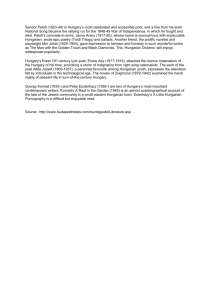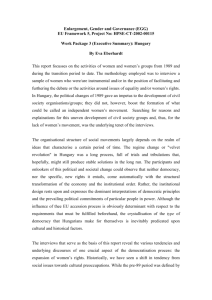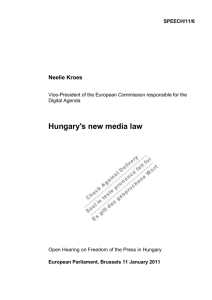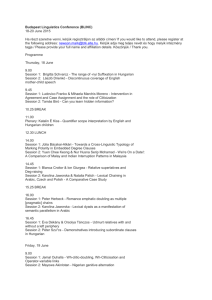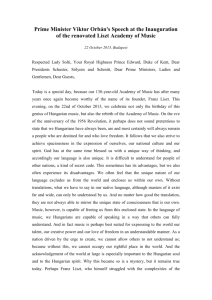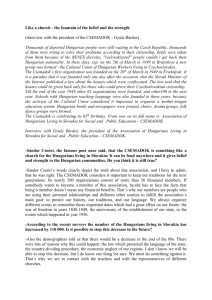The Selection Process In Theory and Practice among international
advertisement
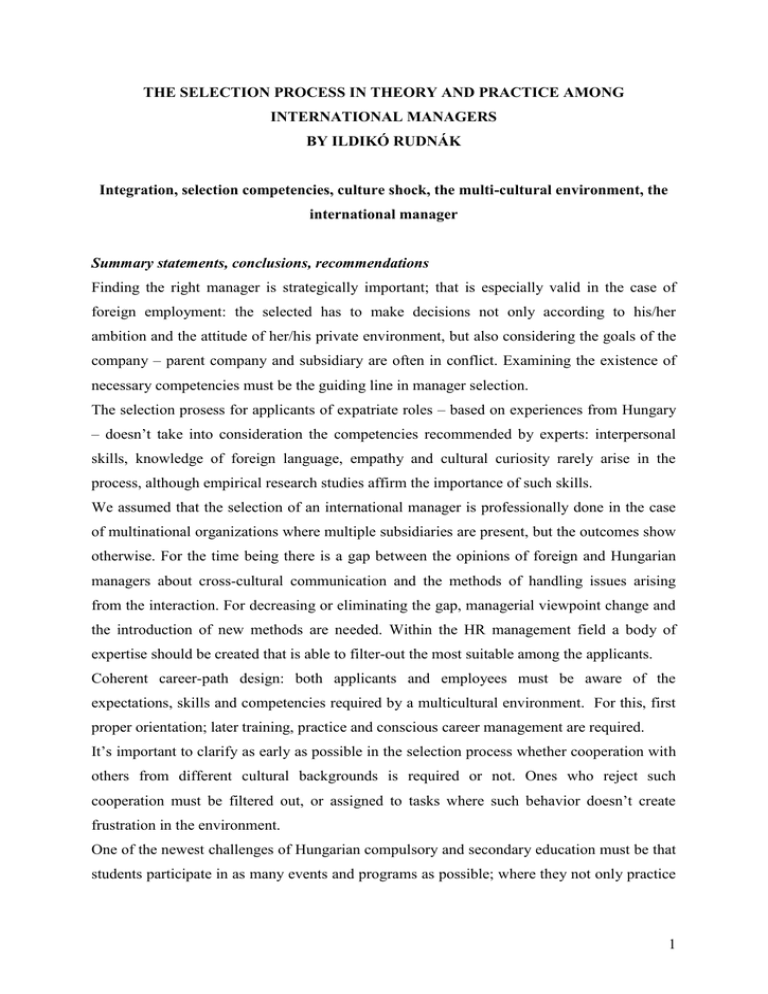
THE SELECTION PROCESS IN THEORY AND PRACTICE AMONG INTERNATIONAL MANAGERS BY ILDIKÓ RUDNÁK Integration, selection competencies, culture shock, the multi-cultural environment, the international manager Summary statements, conclusions, recommendations Finding the right manager is strategically important; that is especially valid in the case of foreign employment: the selected has to make decisions not only according to his/her ambition and the attitude of her/his private environment, but also considering the goals of the company – parent company and subsidiary are often in conflict. Examining the existence of necessary competencies must be the guiding line in manager selection. The selection prosess for applicants of expatriate roles – based on experiences from Hungary – doesn’t take into consideration the competencies recommended by experts: interpersonal skills, knowledge of foreign language, empathy and cultural curiosity rarely arise in the process, although empirical research studies affirm the importance of such skills. We assumed that the selection of an international manager is professionally done in the case of multinational organizations where multiple subsidiaries are present, but the outcomes show otherwise. For the time being there is a gap between the opinions of foreign and Hungarian managers about cross-cultural communication and the methods of handling issues arising from the interaction. For decreasing or eliminating the gap, managerial viewpoint change and the introduction of new methods are needed. Within the HR management field a body of expertise should be created that is able to filter-out the most suitable among the applicants. Coherent career-path design: both applicants and employees must be aware of the expectations, skills and competencies required by a multicultural environment. For this, first proper orientation; later training, practice and conscious career management are required. It’s important to clarify as early as possible in the selection process whether cooperation with others from different cultural backgrounds is required or not. Ones who reject such cooperation must be filtered out, or assigned to tasks where such behavior doesn’t create frustration in the environment. One of the newest challenges of Hungarian compulsory and secondary education must be that students participate in as many events and programs as possible; where they not only practice 1 the learned foreign language, but also gain insight and experience about the other culture. By this the expectations of individual background will be created. Higher education must take a leading role in preparing future managers for challenges of cultural differences; on the one hand by theorical grounding, on the other hand by practical opportunities, and crowning it by the attendance of exchange programs. INTRODUCTION Companies expect their employees to work across borders - maybe for short periods of time or as part of a multidisciplined, multicultural team. But due to the achievements of communication and information technology even those who almost never leave their homes find themselves interacting with foreigners. Companies have to consider increasingly what international tasks and responsibilities their employees must take and the necessary competenties for the different positions should be examined accordingly in the case of international managerial applications. (Braham, K. – Antal, A., 1994)1 People from different parts of the world have to work together and handle their cultural differences deliberately. Most of what we know about dealing with cultural differences on the level of the individual is known from expatriate/delegated managers (so called missionaries, delegated by companies or the Peace Corps). Unfortunately companies do not react to their feedback with proper attention. Although most people consider their international assignment as their most memorable career-experience, it’s not always for the best reasons. Certainly they have the opportunity to solve challenges, make responsible decisions, as well as develop personally and professionally. THE DIFFICULTIES OF CULTURAL INTEGRATION For the expatriate managers, residing in a foreign country is full of constant and unexpected challanges. What is even worse is that their own behavior doesn’t result in the right outcome: techniques that can be used and work at home produce failure and are ineffective. As a matter of fact, the most frequently mentioned reason for failure of a foreign assignment is the expatriate manager’s and family members’ inability to adjust to the local culture. The pressure may even be higher on family members, because the managers are protected by their jobs from cultural contacts, so the family experiences the major part of the shock. That is why it is important to unterstand the adjustment process and identify the warning signs of cultural illnesses. 2 The process of cultural integration Integration to a foreign culture consists of 3 main stages: Stage 1: Enthusiasm and Optimism Stage 2: Frustration Stage 3: Gradual Acclimatization Although the inevitability of the three stages is questionable, these emotional stimuli are not rare. The intensity of such reactions depend on motivation as well as preliminary expectations of the assigned and their family members; what they expected from traveling abroad, the cultural distance of the home and host country and the level of uncertainty of work and/or daily breadwinning activities. (Brett, J.N.et al, 1992)2 Especially Stage 2 deserves special attention, when they don’t find cultural differences attractive anymore, but rather nerve-wracking. This is the time when most foreign postings are in danger: they identify unsettled problems in their interpersonal and workplace behavior that come up at the most unexpected times. Besides getting over the confrontation of the new culture, several unavoidable dilemmas complicate the integration: the manager – because of his/her position – mediates between two cultures and between two parts of the same organization loyalty to both parent company and local branch: directions from the headquarter hurt local interests ready or not to give up own methods or willing to adopt new ones stays behind the closed doors of the expatriate community or becomes a “local” to make peace between responsibility and power: although given major responsibilities, dependent on local managers and employees to accomplish targets Competencies of the integration Let’s see what skills and capabilities are necessary for the effectiveness of foreign employment, given that individuals have different abilities to integrate into new cultural environments. (Schneider, S. – Powley, E., 1984)3: Ability to connect with people: helps the manager to integrate into the social life of the host country Language skills: helps to connect with others 3 Motivation to work abroad, cultural curiosity: motivation to live and work abroad is considered to be a key element for the successful integration of assigned managers and their families. Tolerating uncertainty: have to act frequently with not enough -, unreliable and/or conflicting information Flexibility means they prefer to adapt than introduce limits into the altered conditions Patience and respect are not only important because each culture has it’s own pace, but it takes time to gain experience in this area Cultural empathy: with this skill that’s rooted deeply in the personality and not easily acquired the manager can understand the other person’s viewpoint and the reasons behind the disagreement caused by the difference. Strong self knowledge allows one to interact with another person or culture without being afraid of loosing his/her own identity, but remains critical with him/herself and open to feedback Sense of Humor is important on two levels as an integration mechanism and relationship builder. Developing cultural competencies Personal background The immediate experiences of cultural differences: parents of more and more children have different nationalities, school-age children in international cities study with classmates from different cultural communities, more and more exchange programs exist, etc. Professional experience Early challenge and diverse experience is important in order to understand and respect cultural differences regarding leadership styles and perspectives. When managers are transferred enough, assigned here and there, they will gain cultural sensitivity. Mobility in reality is the key to the internationalization of managers and companies. (Evans, P. et al, 1989)4 Besides holding foreign posts managers can gain global perspectives from working in teams with different nationalities. 4 CULTURAL INTEGRATION OF MANAGERS AT LARGE ENTERPRISES LOCATED IN HUNGARY– EMPIRICAL RESEARCH According to the Hungarian Statistical Bureau (KSH) data in 2006-2008 the number of multinational companies located in Hungary was 8-900, that’s why we made all efforts that the number of inquired companies was around 100. The questionnaires represented 97 multinational companies in the research. The purpose of the sample was to find similar characteristics of managers working in multicultural environments. The survey was taken between the time periods of 2006 to 2008. The number of returned and valuable questionnaires is 338, from which the number of foreign managers is 116 and Hungarian managers is 222. The evaluated companies based on their characteristics are the following: domestic companies – 4%, export/international companies – 7.3%, multinational companies – 81.2%, global companies – 2%, transnational companies – 5.5%. Company size: multinational companies generally are present in the Hungarian economy with over 250 employees. For that reason we asked about the number of employees. The companies according their size are: 1under 50 people – 5.1%, 2- under 250 people – 10.2%, over 250 people is 84.7%. Type of proprietorship: almost a quarter of the companies are American owned, one fifth of the companies are German owned. The Austrian and Japanese ownership is also significant. Except for the two mentioned above, the EU countries represent a quarter, while the miscellaneous category represents only a few percent. According to KSH data, large enterprises in the processing industry (D) represent 58%, in electrical energy, gas, steam and water supply (E) 5%, so the industry sector represents 63% - but in our study they represent 65%. These sectors are the determinative ones. Three quarters of researched companies belong to the industry sector; as for the service sector – such as telecommunications, financial services – nearly one quarter. Regarding nationality the foreign managers show a very mixed picture, mainly German – 13.8%, Austrian – 13.8%, Belgian – 11.2%, Japanese – 8.6%, French – 7.8% managers work in our country. In terms of the sexes about 3 quarters of the ones working abroad are male. 25% of the foreign managers are under 30, 10% are over 50, and 65% are between the two. Selection competencies in practice The selection considerations of the assigned international managers according to empirical research - conducted on managers of large corporations located in Hungary - resulted along the following main competencies: 5 Interest in the Hungarian culture: about 3/4th of foreign managers answered that this competency wasn’t among the selection considerations at all when they applied for managerial positions to Hungary Technical/theoretical capabilities vs. ability to connect well (build connections) with people: mutual opinion among the mangers that the dominant aspect throughout the selection process is the theoretical, professional readiness rather than leadership competencies. Competencies that we considered essential (connecting well, empathy) do not really play a key role when appointing either foreign or local managers. We thought in the case of multinational companies with multiple branches the selection is more prudent and that they take into account the outcomes of research, which proves that when working abroad as a foreign manager diversified roles are needed each day in the foreign environment to match the needs of both parent company and local branches. Knowledge of language – Hungarian language: the foreigners speak the language in a 30 - 70% ratio, so they tend not to speak our language. We are quite skeptical in the 30% since knowing only a few key words could mean „knowledge of language” for some. Generally speakers of Indo-European languages need superhuman energies to acquire our beautiful native language. Although we appreciate it when they learn some basic phrases and are able to use them as a gesture in the right context. Almost 1/10th of Hungarian managers do not consider the ability to have conversations with locals essential while working abroad. This rejecting behavior must be examined. One of the reasons behind this could be the nature of the Hungarian language (Finno-Ugric family) which requires from us a lot more energies invested to master an Indo-European language than those foreigners who themselves speak one of the languages of the enormous Indo-European phylum as their native language. Empathy: both Hungarian and foreign managers alike found it important, but foreigners ranked it higher in the seven-grade scale. Relaxation: passing time, resting and re-charge are needed so the everyday stress –which is even stronger in a foreign environment - wouldn’t overpower and rational judgment would continuously remain. Answers from foreigners totally agree with the above statement, although 20% of Hungarian managers don’t find it important. Maybe they base on their own life and since they do not have enough time for the above-mentioned 6 activities they find them useless. Or maybe not everything is alright with their timemanagement or task-delegating. Humor: well, a sense of humor did not get a notably high ranking, but Hungarian managers – even by an inch only, - ranked the importance of this factor higher than their foreign colleagues. At least our sense of humor is the same! We can build on that! Personal background, professional experience Family Those who from an early age are used to the existence of multiple cultures in their families do not even recognize things that cause frustration for others. About 40% of Hungarian managers never had, 2/3rd didn’t or seldom had contact with others from different cultures as children. About 90% of Hungarian mangers didn’t hear/speak any other languages in family settings: this in part is the explanation of the fact that our foreign-language knowledge shows quite a negative picture and is the direct consequence of Hungary being a single-nationality country where the minority rate is under 10%. (Although earlier it wasn’t the case, as in the middle of the 19th Century less than half of the population living in Hungary had Hungarian nationality. History rewrote borders and after the peace talks of World-War I the hitherto multi-cultured country became homogenous.) Because few of our fellow citizens have contact with people from different cultures/languages from early on, there is lack of motivation for studying foreign languages. Because influencing family circumstances is hardly possible, the goal is to strengthen child age and adolescent age acquired experiences of different cultures, which can motivate in multiple directions: either for language learning, for constant improvement of language knowledge, or early recognition and learning of tolerance. About 1/4th of foreign managers use other languages besides their native one from their childhood, which can be useful in the business world especially in the areas mentioned. School Hungarian managers throughout their elementary and secondary education had only limited opportunities to come to know other cultures, while the foreign ones in this respect show a better picture: only a little more than one-third of them had no contact with people from different cultures at the ages noted. The exchange programs of higher education haven’t produced notable results, at least with respect to current managers whether viewing Hungarians or foreigners. Hungarian managers – on the basis of their age – completed their higher education studies before the political system 7 change so this depressing result is clear: approx. 10% of them participated in exchange programs and this 10% is probably from the recent past. The adult-age environment – Family The spouses of Hungarian businessmen tolerate foreign assignment less well than their foreign counterparts. A quarter of Hungarian ones don’t support their spouses, while one third of the foreign ones support them completely. From the viewpoint of children in their families, 80% of foreign respondents agree that long term foreign residency is advantageous, while only 60% of Hungarian respondents are of the same standing. While in a foreign family’s lifestyle living abroad is clearly a positive, motivating factor, for Hungarians this is only moderately touched upon. Although if we think about language knowledge that was discussed earlier and we consider it as a single factor, a native Hungarian child is able to acquire in a more natural way – even to a native level – a foreign language that would ensure them enormous advantages in the future. The workplace – Foreign Assignment As a manager you have to pay attention not only to the conditions dictated by the market, but the needs of young adults. It seems that 3/4th of managers see that entrants demand – just as part of the process of becoming an international manager – foreign assignments. About 10% of Hungarian managers disagree that the opportunity of foreign employment attracts fresh graduates. It seems as if there was some kind of an edge among the opinions in this respect: these managers start from the fact that it’s hard enough to find a job so entrants should be happy to get a job at all or they think that after they have put something on the plate foreign assignment could later be discussed. University/college students spend several weeks at different companies as part of their internship, so managers should take advantage of the opportunity to understand young people’s long and short-term plans, ideas and needs regarding future places of work. At multinational companies foreign employees more willingly spend time with Hungarian or other nationality associates than the Hungarians do. This is a result we need to pay attention to and find the reasons behind. List of Sources: 1. Braham, K. – Antal, A. (1994): Competences for the pan-European manager in P.S.Kirkbride (ed) Human Resource Management in Europe, Ch. 14, London: Routledge, 222-41. 8 2. Brett, J.N. – Stroh, L.K. – Reilly, A.H. (1992): Job transfer in C.L. Cooper and I.T. Roninson (eds) International Review of Industrial and Organizational Psychology, Chichester: Wiley, pp. 93-138 3. Schneider, S. – Powley, E. (1984): Changing images: The case of AT&T, INSEAD case series. 4. Evans, P. – Doz, Y. – Laurent, A. (eds) (1989) Human Resource Management in International Firms, London: Macmillian. 5. The author’s PhD Dissertation (2009) The challenges of a multicultural environment with respect to managers at large enterprises located in Hungary Dr. Ildikó Rudnák Assistant Professor Szent István University Faculty of Business and Social Sciences Department of Social Sciences Email: Rudnak.Ildiko@gtk.szie.hu Tel.: 20/9-134-175 9

